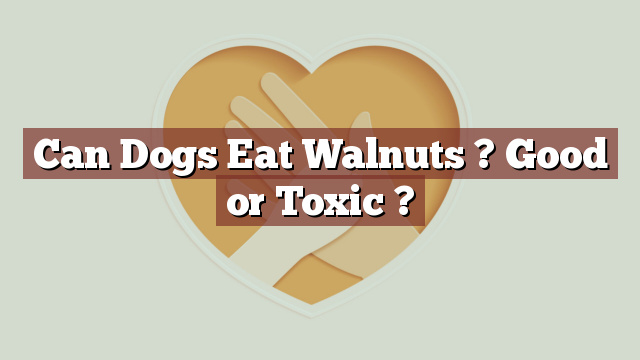Can Dogs Eat Walnuts? Good or Toxic?
As responsible pet owners, it is crucial to be aware of the foods that are safe and healthy for our furry friends. One common question that often arises is whether dogs can eat walnuts. In this article, we will explore the nutritional value of walnuts, discuss their safety and potential risks for dogs, and provide guidance on what to do if your dog consumes walnuts.
Nutritional Value of Walnuts: Vitamins, Minerals, and Healthy Fats
Walnuts are known for their rich nutritional profile, making them a popular snack among humans. They are packed with essential vitamins and minerals such as vitamin E, B vitamins, magnesium, phosphorus, and copper. Moreover, walnuts are a great source of healthy fats, including omega-3 fatty acids, which can promote heart health and reduce inflammation.
Can Dogs Eat Walnuts? Exploring Safety and Toxicity
Can dogs eat walnuts? While walnuts offer various health benefits for humans, they may not be suitable for our canine companions. Walnuts can pose potential risks to dogs due to their high-fat content and the presence of certain substances that may be toxic to them. The high-fat content in walnuts can lead to gastrointestinal upset, pancreatitis, and weight gain in dogs.
Additionally, walnuts contain a substance called juglone, which is mildly toxic to dogs. Juglone is found in the leaves, hulls, and roots of walnuts, but it is present in smaller amounts in the actual nut. However, even in small amounts, juglone can cause digestive issues and discomfort for dogs.
Potential Risks or Benefits of Dogs Consuming Walnuts
While walnuts have several nutritional benefits for humans, the risks associated with dogs consuming walnuts outweigh the potential benefits. The high-fat content can lead to digestive problems and weight gain in dogs, potentially leading to more severe health issues like pancreatitis. Additionally, the presence of juglone in walnuts can cause digestive upset and discomfort in dogs.
It is important to note that some dogs may be more tolerant of walnuts than others. However, it is generally recommended to avoid feeding walnuts to dogs to prevent any potential health complications.
My Dog Ate Walnuts, What Should I Do? Steps to Take
If your dog has accidentally consumed walnuts, it is essential to take appropriate steps to ensure their well-being. Firstly, remove any remaining walnuts to prevent further ingestion. If your dog only consumed a small amount of walnuts and shows no signs of discomfort, monitor them closely for any digestive issues or unusual behavior. However, if your dog exhibits symptoms such as vomiting, diarrhea, abdominal pain, or lethargy, it is crucial to seek veterinary attention immediately.
Conclusion: Moderation is Key, Consult a Vet for Individual Cases
In conclusion, while walnuts offer numerous health benefits for humans, they are not recommended for dogs. The high-fat content and the presence of juglone make them potentially harmful to our canine companions. It is always best to err on the side of caution and avoid feeding walnuts to dogs to prevent any potential health risks.
If you have any concerns or questions about your dog’s diet or if your dog has consumed walnuts and is experiencing symptoms, it is advisable to consult with a veterinarian. They can provide personalized advice and guidance tailored to your dog’s specific needs and ensure their overall well-being. Remember, moderation and a balanced diet are key to keeping our furry friends happy and healthy.
Thank you for investing your time in exploring [page_title] on Can-Eat.org. Our goal is to provide readers like you with thorough and reliable information about various dietary topics. Each article, including [page_title], stems from diligent research and a passion for understanding the nuances of our food choices. We believe that knowledge is a vital step towards making informed and healthy decisions. However, while "[page_title]" sheds light on its specific topic, it's crucial to remember that everyone's body reacts differently to foods and dietary changes. What might be beneficial for one person could have different effects on another. Before you consider integrating suggestions or insights from "[page_title]" into your diet, it's always wise to consult with a nutritionist or healthcare professional. Their specialized knowledge ensures that you're making choices best suited to your individual health needs. As you navigate [page_title], be mindful of potential allergies, intolerances, or unique dietary requirements you may have. No singular article can capture the vast diversity of human health, and individualized guidance is invaluable. The content provided in [page_title] serves as a general guide. It is not, by any means, a substitute for personalized medical or nutritional advice. Your health should always be the top priority, and professional guidance is the best path forward. In your journey towards a balanced and nutritious lifestyle, we hope that [page_title] serves as a helpful stepping stone. Remember, informed decisions lead to healthier outcomes. Thank you for trusting Can-Eat.org. Continue exploring, learning, and prioritizing your health. Cheers to a well-informed and healthier future!

